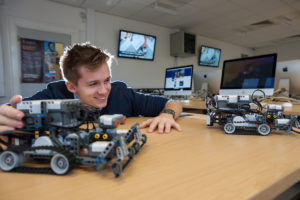Mathematics and Computer Science
UCAS code GG14
- Study mode
- Full-time
- Duration
- 3 years
- Start date and application deadlines
-
- Start date
UCAS code GG14
Mathematicians and computer scientists are amongst the most highly-prized graduates today.
On this programme, you will divide your studies more or less equally between the two subjects, studying modules from Mathematics and Computer Science.
Mathematics is a fascinating, beautiful and diverse subject to study. It underpins a wide range of disciplines; from physical sciences to social science, from biology to business and finance. At Liverpool, our programmes are designed with the needs of employers in mind, to give you a solid foundation from which you may take your career in any number of directions.
From the underlying principles to the very edge of modern technology, this programme will cover aspects of Computer Science and ensure that when you graduate you will know exactly what is and isn’t possible with computers.

We’re proud to announce we’ve been awarded a Gold rating for educational excellence.
Discover what you'll learn, what you'll study, and how you'll be taught and assessed.
Year one of the programme has been designed as an even split between subjects related to computing and mathematics.
In year one students will typically undertake either COMP101 (Introduction to Programming) or COMP105 (Programming Language Paradigms) based on prior exposure to programming (eg Computer Science A level). Students without a background will normally study COMP101, however in some instances may be permitted to enrol on COMP105 instead.
All other year one modules are required.
| Optional modules | Credits |
|---|---|
| NEWTONIAN MECHANICS (MATH122) | 15 |
| NUMBERS, GROUPS AND CODES (MATH142) | 15 |
| INTRODUCTION TO STATISTICS USING R (MATH163) | 15 |
Programme details and modules listed are illustrative only and subject to change.
In year two you continue with a mix of modules related to computer science and mathematics but also have the opportunity to specialise in certain subject areas of your choice.
| Compulsory modules | Credits |
|---|---|
| COMPLEXITY OF ALGORITHMS (COMP202) | 15 |
Programme details and modules listed are illustrative only and subject to change.
Programme details and modules listed are illustrative only and subject to change.
Teaching is by a mix of formal lectures, small group tutorials and supervised laboratory-based practical sessions. Students also undertake individual and group projects. Key problem solving skills and employability skills, like presentation and teamwork skills, are developed throughout the programme.
The main modes of assessment are through a combination of coursework and examination, but depending on the modules taken you may encounter project work, presentations (individual or group), and specific tests/tasks focused on solidifying learning outcomes.
We have a distinctive approach to education, the Liverpool Curriculum Framework, which focuses on research-connected teaching, active learning, and authentic assessment to ensure our students graduate as digitally fluent and confident global citizens.
The Liverpool Curriculum framework sets out our distinctive approach to education. Our teaching staff support our students to develop academic knowledge, skills, and understanding alongside our graduate attributes:
Our curriculum is characterised by the three Liverpool Hallmarks:
All this is underpinned by our core value of inclusivity and commitment to providing a curriculum that is accessible to all students.
The qualifications and exam results you'll need to apply for this course.
| Qualification | Details |
|---|---|
| A levels |
BBC (including Mathematics: B) |
| GCSE |
4/C in English and 4/C in Mathematics |
| BTEC Level 3 national extended diploma |
DDM in a relevant diploma and A level Mathematics. |
| BTEC combinations |
BTEC National Diploma DM plus B in Mathematics at A level; BTEC National Extended Certificate M plus BB including Mathematics at A level at grade B. |
| Welsh Baccalaureate Advanced |
C in the Welsh Baccalaureate, plus BB at A level to include Mathematics grade B. |
| Access |
Pass relevant Access to HE Diploma with 45 Level 3 credits with 27 at Distinction including 15 in Mathematical or Computer Science credits and 18 at Merit |
Studying with us means you can tailor your degree to suit you. Here's what is available on this course.
University of Liverpool students can choose from an exciting range of study placements at partner universities worldwide.
Immerse yourself in Chinese culture on an optional additional year at Xi'an Jiaotong Liverpool University in stunning Suzhou.
Broaden your world by spending an additional year of study at a partner university abroad following your second year of study.
Spend a summer abroad on a study placement or research project at one of our worldwide partner institutions.
Year in industry placements give you an in-depth workplace experience where you can develop your skills and apply your learning.
If you'd like to undertake a year in industry, you can transfer to Mathematics and Computer Science with a Year in Industry BSc (Hons) during your studies, subject to meeting the academic requirements of your course.
To spend a year in industry, you'll need to secure a placement with an organisation. If you're unable to find a placement, you'll continue with the standard version of the course without a year in industry.
Every student at The University of Liverpool can study a language as part of, or alongside their degree. You can choose:
We have a large department with highly qualified staff, a first-class reputation in teaching and research, and a great city in which to live and work.






From arrival to alumni, we’re with you all the way:
The academic staff in the Department are fantastic and their doors are all open if you want to go and talk to them.

Want to find out more about student life?
Chat with our student ambassadors and ask any questions you have.
A mathematically-based degree opens up a wide range of career opportunities, including some of the most lucrative professions.
Recent employers of our graduates are:
87% of computer science students find their main activity after graduation meaningful.
(Graduate Outcomes, 2018-19.)
Hear what graduates say about their career progression and life after university.

Graduating from Computer Science in 2013, Kirsty describes her time at the University of Liverpool and how she is now running her own tech startup.

Read about the path Lydia took at Liverpool and the skills she highlights as being important to employers.
Your tuition fees, funding your studies, and other costs to consider.
Full-time place, per year - £9,535
Year abroad fee - £1,430 (applies to year in China)
Full-time place, per year - £28,300
Year abroad fee - £14,150 (applies to year in China)
The tuition fees shown are correct for 2025/26 entry. Please note that the year abroad fee also applies to the year in China.
Tuition fees cover the cost of your teaching and assessment, operating facilities such as libraries, IT equipment, and access to academic and personal support. Learn more about paying for your studies.
Your tuition fee covers almost everything but you may have additional study costs to consider, such as books.
Find out more about the additional study costs that may apply to this course.
We offer a range of scholarships and bursaries that could help pay your tuition and living expenses.
If you’re a UK student joining an undergraduate degree and have a household income below £35,000, you could be eligible for a Liverpool Bursary worth up to £2,000 for each year of undergraduate study.
Apply for an Asylum Seekers Scholarship and you could have your tuition fees paid in full and receive help with study costs. You’ll need to have applied for asylum in the UK, or be the dependant of an asylum seeker, and be joining an eligible undergraduate degree.
If you’ve spent 13 or more weeks in Local Authority care since age 14, you could be eligible for a bursary of £3,000 per year of study. You’ll need to be a UK student joining an eligible undergraduate degree and be aged 28 or above on 1 September in the year you start.
Are you a UK student with a Black African or Caribbean heritage and a household income of £25,000 or less? You could be eligible to apply for a Cowrie Foundation Scholarship worth up to £8,000 for each year of undergraduate study.
If you’re a UK student identified as estranged by Student Finance England (or the equivalent UK funding body), you could be eligible for a bursary of £1,000 for each year of undergraduate study.
Joining a School of Biosciences degree and have a household income of less than £25,000? If you’re a UK student, you could apply to receive £4,500 per year for three years of your undergraduate course.
Do you live in the Liverpool City Region with a household income of £25,000 or less? Did neither of your parents attend University? You could be eligible to apply for a Nolan Scholarship worth £5,000 per year for three years of undergraduate study.
Are you a UK student with a household income of £25,000 or less? If you’ve participated in an eligible outreach programme, you could be eligible to apply for a Rigby Enterprise Award worth £5,000 per year for three years of your undergraduate degree.
Are you a UK student with a household income of £25,000 or less? Did neither of your parents attend University? You could be eligible to apply for a ROLABOTIC Scholarship worth £4,500 for each year of your undergraduate degree.
Apply to receive tailored training support to enhance your sporting performance. Our athlete support package includes a range of benefits, from bespoke strength and conditioning training to physiotherapy sessions and one-to-one nutritional advice.
Joining a degree in the School of Electrical Engineering, Electronics and Computer Science? If you’re a UK student with household income below £25,000, you could be eligible to apply for £5,000 a year for three years of study. Two awards will be available per academic year.
If you’re a young adult and a registered carer in the UK, you might be eligible for a £1,000 bursary for each year of study. You’ll need to be aged 18-25 on 1 September in the year you start your undergraduate degree.
Use our handy chatbot for your Clearing enquiries.
Last updated 17 June 2025 / / Programme terms and conditions